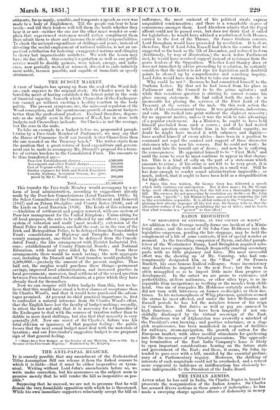THE ANTI-PAPAL MEASURE.
IT is scarcely possible that any amendment of the Ecclesiastical Titles Assumption Bill can release it from the forked censure to which it is liable—that it must be either inoperative or tyran- nical. Writing without Lord John's amendments before us, we write under correction but his assurances on the subject seem to promise merely that he will render the bill as inoperative as pos- sible.*
Supposing that he succeed, we are not to presume that he will disarm the very formidable opposition with which he is threatened. While his own immediate supporters reluctantly accept the bill on sufferance, the most eminent of his political rivals express unqualified condemnation ; and there is a remarkable degree of concurrence amongst them. Lord Aberdeen admits that the Papal affront could not be passed over, but does not think that it called for legislation ; he would have advised a resolution of both Houses, carried to the foot of the Throne. Sir James Graham concurs. Lord Brougham would have proceeded by resolution. It is clear, therefore, that if Lord John Russell had taken the course that we suggested so far back as the 7th of December, and reduced to form (fictitiously, by way of illustration,) the week before Parliament met, he would have received support instead of resistance from the grave leaders of the Opposition. Whether Lord Stanley does or does not immediately advise proceeding by resolution, he certainly considers that the matter is not ripe for legislation until doubtful points be cleared up by comprehensive and searching inquiry. Lord John would have done better to take our warning.
Why could he not ?—Because he had committed himself to the Durham Letter. By that act he had issued from his place in Parliament and the Council to be the prime agitator ; and while this vexatious question is stirring he cannot resume his place among statesmen. He had called forth the mob—he is answerable for placing the services of the First Lord of the Treasury at the service of the mob. On this rash action the whole of his embarrassment turns. It was gratuitous, indecorous, and vain. He rushed into print without the slightest necessity ; for no apparent motive, unless it was the wish to take advantage of a popular excitement. As a Minister, he ought to have held himself precluded from such a course ; and if he had waited until the question came before him in his official capacity, no doubt he might have treated it with calmness and dignity— have availed himself of every advice—have been in a position to command not repel the counsel and support of those discreeter statesmen who are now his censors. But he could not wait ; he must rush into the tumult out of doors ; and now he is suffering the consequences. He appointed himself to be "First Mob," and until the scene be over he must continue to appear in that charac- ter. This is a kind of sally on the part of a statesman which amounts to crime ; if his crime is not felt to be very great, it is because he is dealing with small matters, in a small way. Still he has done enough to render sound administration impossible ; so much, indeed, that it ought to have been held as a disqualification for high office.
* Since this was written, Sir George Grey has delivered a speech which fully confirms our anticipation. But it does more ; for Sir George helps most efficiently in showing that the bill was a thoroughly improper bill. His excuses for not proceeding by resolution are feeble—as Mr. Sohn. Stuart said, "puerile" ; but Ministers have succeeded in rendering the bill as like a resolution as possible. It is all but reduced to the "whereas." Ex- plaining how utterly improper all the rest was, Sir George tells us that the alterations reduce it the portion prohibiting the use of titles ; and he boasts that what remains is a "protest" to that effect!


























 Previous page
Previous page